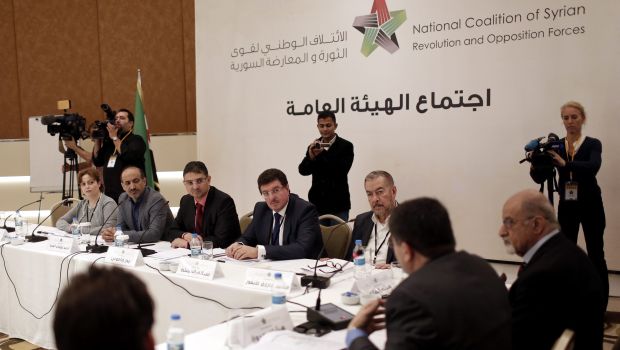
Syrian National Coalition member Suheir Atassi, head Ahmed Al-Jarba, Secretary General National Coalition of Syria Badr Jamous, Member National Coalition Of Syria Salim Muslit, Leaders of the exiled Syrian National Council, Muhammet Faruq Tayfur during a Syrian opposition groups meeting in Istanbul, Turkey, on November 9, 2013. (EPA/SEDAT SUNA)
Beirut/London, Asharq Al-Awsat—In a statement published on the Syrian Kurdish Democratic Union Party’s (PYD) website on Tuesday, the PYD announced the establishment of a transitional administration to run the affairs of the northeastern region of Syria.
The announcement came following a meeting in the town of Qamishli, in northeastern Syria, which was attended by “all people of the region—Kurdish, Arab, Christian and Chechen—and resulted in the announcement of the establishment of a transitional administration for the Western Kurdistan Region in Syria.”
The statement said the region would be divided into three areas: Al-Jazira, Koubani and Afrin, and that each area would form its own local council that would then send representatives in the general council. It also said the task of the transitional administration was to prepare local election laws and prepare for general elections, as well as enacting laws and deal with the economic, security and political issues in the area and in Syria a whole.
The PYD’s UK-based representative, Alan Semo, told the BBC that “the region would be integrated in future in a united, democratic, plural Syria.”
He said Turkey, which has been working to resolve its issues with Kurdish separatists active in its eastern region, should not have any concerns about the move. He was quoted by the BBC as saying: “I think Turkey will realize that this step is not a threat to any regional or international or global stability, it is temporary.”
Meanwhile, the Syrian interim government elected at the end of the Syrian National Coalition of Opposition Forces meeting in Istanbul on Monday will start work on Wednesday in the Turkish town of Gaziantep.
Their work will focus on providing services in opposition-controlled areas and aid to refugees, as well as organizing security at border crossing points.
The interim government has yet to appoint ministers of health, education, and the interior, because the candidates originally proposed did not win support.
Ahmad Ramadan, a member of the Syrian National Coalition, told Asharq Al-Awsat: “The elections for the vacant government portfolios will take place during the first meeting called by the general council of the Coalition.
“The prime minister has tasked some ministers with the duties of the vacant ministries in the interim, to ensure the [ministries’] work is not disrupted.
He added: “The government will start work in the next couple of days at its headquarters near the Turkey–Syria border.”
Ramadan denied that people in “liberated” areas were living in a state of “chaos” that prevented the ministries from carrying out their tasks, adding that “the government will clear the backlog left by the coordination committees and other organizations.”
The Coalition tried to address ethnic and sectarian sensitivities, as well as other tensions in Syrian society, in its election of the interim government. The government includes a Kurdish minister, a Christian minister, and a woman who was elected as a minister of culture.
No minister was elected from the Alawite sect, to which Bashar Al-Assad belongs.
Ramadan told Asharq Al-Awsat: “The election of ministers was carried out according to experience and competence, not on a sectarian or ethnic representation basis.”
This came following criticisms from the Coalition’s Assyrian bloc of the way the interim government was formed, claiming they were “ignored.”
Ahmad Tomeh will be prime minister of the interim government. He also temporarily has the health portfolio. Iyad Al-Qudsi will be the deputy prime minister and the interim education minister. As’ad Mostafa will take charge of the defense minister and is also the temporary interior minister.
Other new ministerial appointments include Ibrahim Miro as finance and economy minister, Mohamed Yasin Al-Najjar as communication and industry minister, Othman Bedaiwi as local administration minister, Fayiz Al-Dhair as justice minister, Ilyas Wardeh as energy minister, Walid Al-Zaoubi as minister of infrastructure and agriculture, and Taghrid Al-Hajli as culture minister.
